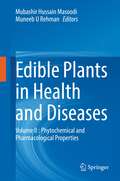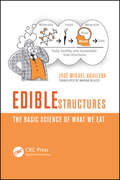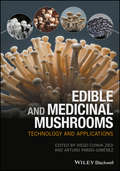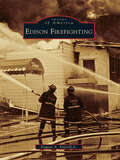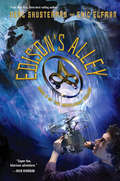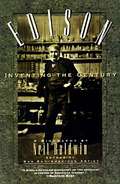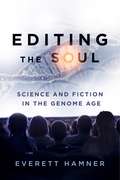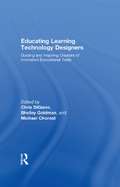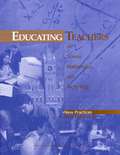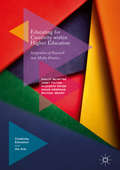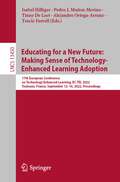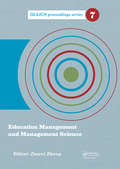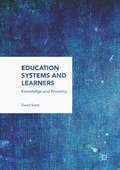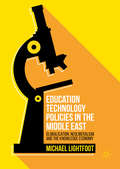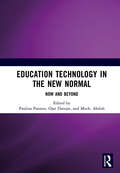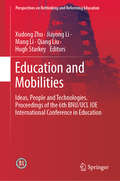- Table View
- List View
Edible Plants in Health and Diseases: Volume II : Phytochemical and Pharmacological Properties
by Mubashir Hussain Masoodi Muneeb U RehmanThe book provides essential information on some of the promising edible medicinal plants and how these possess both nutritional as well as therapeutic value. The significance of the edible plants in traditional medicine and the importance of the distribution of their chemical constituents are discussed systematically concerning the role of these plants in ethnomedicine in different regions of the world. The current volume deals with the individual plants' phytochemical and pharmacological properties, emphasizing human health. The title would demonstrate the value of natural edible plants and introduce readers to state-of-the-art developments and trends in omics-driven research. This book is a single-source scientific reference to explore the specific factors that contribute to these potential health benefits and discuss how to maximize those potential benefits. Chemists, food technologists, pharmacologists, phytochemists, and all professionals involved with quality control and standardization will find in this book a valuable and updated basis for their work.
Edible Structures: The Basic Science of What We Eat
by Jose Miguel AguileraNature converts molecules into edible structures, most of which are then transformed into products in factories and kitchens. Tasty food structures enter our mouths and different sensations invade our bodies. By the time these structures reach our cells, they have been broken back down into molecules that serve as fuel and raw materials for our bod
Edible and Medicinal Mushrooms: Technology and Applications
by Arturo Pardo-Giménez Diego Cunha ZiedComprehensive and timely, Edible and Medicinal Mushrooms: Technology and Applications provides the most up to date information on the various edible mushrooms on the market. Compiling knowledge on their production, application and nutritional effects, chapters are dedicated to the cultivation of major species such as Agaricus bisporus, Pleurotus ostreatus, Agaricus subrufescens, Lentinula edodes, Ganoderma lucidum and others. With contributions from top researchers from around the world, topics covered include: Biodiversity and biotechnological applications Cultivation technologies Control of pests and diseases Current market overview Bioactive mechanisms of mushrooms Medicinal and nutritional properties Extensively illustrated with over 200 images, this is the perfect resource for researchers and professionals in the mushroom industry, food scientists and nutritionists, as well as academics and students of biology, agronomy, nutrition and medicine.
Edison
by Edmund MorrisFrom Pulitzer Prize-winning author Edmund Morris comes a revelatory new biography of Thomas Alva Edison, the most prolific genius in American history. Although Thomas Alva Edison was the most famous American of his time, and remains an international name today, he is mostly remembered only for the gift of universal electric light. His invention of the first practical incandescent lamp 140 years ago so dazzled the world—already reeling from his invention of the phonograph and dozens of other revolutionary devices—that it cast a shadow over his later achievements. <P><P>In all, this near-deaf genius (“I haven’t heard a bird sing since I was twelve years old”) patented 1,093 inventions, not including others, such as the X-ray fluoroscope, that he left unlicensed for the benefit of medicine. <P><P>One of the achievements of this staggering new biography, the first major life of Edison in more than twenty years, is that it portrays the unknown Edison—the philosopher, the futurist, the chemist, the botanist, the wartime defense adviser, the founder of nearly 250 companies—as fully as it deconstructs the Edison of mythological memory. Edmund Morris, winner of the Pulitzer Prize and the National Book Award, brings to the task all the interpretive acuity and literary elegance that distinguished his previous biographies of Theodore Roosevelt, Ronald Reagan, and Ludwig van Beethoven. A trained musician, Morris is especially well equipped to recount Edison’s fifty-year obsession with recording technology and his pioneering advances in the synchronization of movies and sound. <P><P>Morris sweeps aside conspiratorial theories positing an enmity between Edison and Nikola Tesla and presents proof of their mutually admiring, if wary, relationship. Enlightened by seven years of research among the five million pages of original documents preserved in Edison’s huge laboratory at West Orange, New Jersey, and privileged access to family papers still held in trust, Morris is also able to bring his subject to life on the page—the adored yet autocratic and often neglectful husband of two wives and father of six children. <P><P>If the great man who emerges from it is less a sentimental hero than an overwhelming force of nature, driven onward by compulsive creativity, then Edison is at last getting his biographical due. <P><b>A New York Times Bestseller</b>
Edison Firefighting (Images of America)
by Eugene A. Enfield Jr.During the early part of the 20th century, five separate volunteer fire companies independently organized to protect separate sections of Raritan Township, currently known as Edison. The township was divided by fire districts, each containing elected fire commissioners with political and economic power. In 1926, the first career firefighter was hired, and since then, over 250 career firefighters have taken the oath. Edison Firefighting features images, memorabilia, and photographs from the early days of bucket brigades and horse-drawn carriages to current personnel and apparatus. Significant fires, explosions, and rescues that Edison firefighters confronted throughout the years are revealed within this fascinating book.
Edison vs. Tesla: The Battle over Their Last Invention
by Joel MartinThomas Edison closely following the alternative physics work of Albert Einstein and Max Planck, convincing him that there was an entire reality unseen by the human eye. This led to the last and least-known of all Edison’s inventions, the spirit phone. His former associate, now bitter rival, Nikola Tesla, was also developing at the same time a similar mysterious device. Edison vs. Tesla examines their quest to talk to the dead. It reveals:Edison’s little-known near-death experience formed his theory that animate life forms don’t die, but rather change the nature of their composition. It is this foundational belief that drove him to proceed with the spirit phone.Tesla monitored Edison’s paranormal work, with both men racing to create a device that picked up the frequencies of discarnate spirits, what today is called EVP (Electronic Voice Phenomenon).Both men were way ahead of their time, delving into artificial intelligence and robotics.Although mystery and lore surround the details of the last decade of Edison’s life, many skeptics have denied the existence of the mysterious spirit phone. The authors have researched both Edison’s and Tesla’s journals, as well as contemporary articles and interviews with the inventors to confirm that tests were actually done with this device. They also have the full cooperation of the Charles Edison fund, affording them access to rare photos and graphics to support their text. Edison vs. Tesla sheds light on this weird invention and demonstrates the rivalry that drove both men to new discoveries.
Edison's Alley (The Accelerati Trilogy #2)
by Neal Shusterman Eric ElfmanFourteen-year-old Nick has learned that the strange antiques in his attic bedroom were left there by the eccentric inventor Nikola Tesla. They are pieces of Tesla's Far Range Energy Emitter, capable of transmitting "free energy" to the globe. Some components of the contraption are still missing, but the objects themselves seem to be leading Nick and his friends to their current owners. However, members of the Accelerati, a menacing secret society of physicists, are on the hunt too, and their brazen leader, Dr. Alan Jorgenson, will stop at nothing to foil Nick and steal the objects. It takes a dangerous build-up of electromagnetic energy in the atmosphere to reverse everyone's fortunes--and lead Nick to his destiny. Readers who enjoyed the strange science, quirky humor, and out-of-this-world plot twists in Tesla's Attic will be captivated by this second book in the electrifying Accelerati Trilogy.
Edison's Concrete Piano: Flying Tanks, Six-Nippled Sheep, Walk-on-Water Shoes, and 12 Other Flops from Great Inventors
by Judy WearingNot even geniuses get it right the first time . . . An &“entertaining&” look at the failures of great inventors (Booklist). To achieve great things, you have to be willing to take risks—and as Edison&’s Concrete Piano reveals, some of the most famous names in history experienced plenty of flops and face-plants in the course of their careers. Thomas Edison, for example, not only revolutionized the world with the light bulb, but also designed a concrete piano, a nonoperational helicopter made from box kites and piano wire, and a machine to speak to the dead. Alexander Graham Bell, inventor of the telephone, actually devoted most of his time to his sheep farm in Nova Scotia—devising a multi-nippled sheep somewhere along the way. You&’ll also read about Leonardo da Vinci&’s walk-on-water shoes, George Washington Carver&’s miracle peanut cure, and much more. The ludicrous ideas, faulty designs, and offbeat hobbies in this volume will inspire laughs—and serve as a reminder that even the very best minds make mistakes. &“Captivating . . . This book is full of lessons for inventors and non-inventors alike.&” —Henry Petroski, author of Success through Failure
Edison's Electric Light: The Art of Invention (Johns Hopkins Introductory Studies in the History of Technology)
by Robert Friedel Paul B. IsraelIn September 1878, Thomas Alva Edison brashly—and prematurely—proclaimed his breakthrough invention of a workable electric light. That announcement was followed by many months of intense experimentation that led to the successful completion of his Pearl Street station four years later. Edison was not alone—nor was he first—in developing an incandescent light bulb, but his was the most successful of all competing inventions. Drawing from the documents in the Edison archives, Robert Friedel and Paul Israel explain how this came to be. They explore the process of invention through the Menlo Park notes, discussing the full range of experiments, including the testing of a host of materials, the development of such crucial tools as the world's best vacuum pump, and the construction of the first large-scale electrical generators and power distribution systems. The result is a fascinating story of excitement, risk, and competition.Revised and updated from the original 1986 edition, this definitive study of the most famous invention of America's most famous inventor is completely keyed to the printed and electronic versions of the Edison Papers, inviting the reader to explore further the remarkable original sources.
Edison's Ghosts: The Untold Weirdness of History's Greatest Geniuses
by Katie SpaldingPublishers Weekly Best Summer Reads Overturn everything you knew about history&’s greatest minds in this raucous and hilarious book, where it turns out there's a finer line between "genius" and "idiot" than we've previously known. &“As Albert Einstein almost certainly never said, everyone is a genius – but if you judge a fish by its ability to climb a tree, it will live its whole life believing that it is stupid.&” So begins Katie Spalding&’s spunky takedown of the Western canon, and how genius may not be as irrefutably great as we commonly understand. While most of us may never become Einstein, it may surprise you to learn that there&’s probably a bunch of stuff you can do that Einstein couldn&’t. And, as Spalding shows, the famous prodigies she explores here were quite odd by any definition. For example: Thomas Edison, inventor of the lightbulb, believed that he could communicate with the undead and built the world&’s very first hotline to heaven: the Spirit Phone. Marie and Pierre Curie, famous for discovering radioactivity, slept next to a lump of radioactive material for years and strapped it to their arms to watch it burn them in real-time. Lord Byron, acclaimed British poet, literally took a bear with him to university. Isaac Newton discovered the laws of gravity and motion, but he also looked up at the sun without eye protection. The result? Three days of blindness. Tesla, whose scientific work led to the invention of the AC unit, fell in love with a pigeon. Edison's Ghosts is filled with examples of the so-called best of humanity doing, to put it bluntly, some really dumb shit. You&’ll discover stories that deserve to be told but never are: the hilarious, regrettable, and downright bafflingly lesser-known achievements that never made it into our history books, until now.
Editing the Soul: Science and Fiction in the Genome Age (AnthropoScene)
by Everett HamnerPersonal genome testing, gene editing for life-threatening diseases, synthetic life: once the stuff of science fiction, twentieth- and twenty-first-century advancements blur the lines between scientific narrative and scientific fact. This examination of bioengineering in popular and literary culture shows that the influence of science on science fiction is more reciprocal than we might expect.Looking closely at the work of Margaret Atwood, Richard Powers, and other authors, as well as at film, comics, and serial television such as Orphan Black, Everett Hamner shows how the genome age is transforming both the most commercial and the most sophisticated stories we tell about the core of human personhood. As sublime technologies garner public awareness beyond the genre fiction shelves, they inspire new literary categories like “slipstream” and shape new definitions of the human, the animal, the natural, and the artificial. In turn, what we learn of bioengineering via popular and literary culture prepares the way for its official adoption or restriction—and for additional representations. By imagining the connections between emergent gene testing and editing capacities and long-standing conversations about freedom and determinism, these stories help build a cultural zeitgeist with a sharper, more balanced vision of predisposed agency.A compelling exploration of the interrelationships among science, popular culture, and self, Editing the Soul sheds vital light on what the genome age means to us, and what’s to come.
Editing the Soul: Science and Fiction in the Genome Age (AnthropoScene: The SLSA Book Series #2)
by Everett HamnerPersonal genome testing, gene editing for life-threatening diseases, synthetic life: once the stuff of science fiction, twentieth- and twenty-first-century advancements blur the lines between scientific narrative and scientific fact. This examination of bioengineering in popular and literary culture shows that the influence of science on science fiction is more reciprocal than we might expect.Looking closely at the work of Margaret Atwood, Richard Powers, and other authors, as well as at film, comics, and serial television such as Orphan Black, Everett Hamner shows how the genome age is transforming both the most commercial and the most sophisticated stories we tell about the core of human personhood. As sublime technologies garner public awareness beyond the genre fiction shelves, they inspire new literary categories like “slipstream” and shape new definitions of the human, the animal, the natural, and the artificial. In turn, what we learn of bioengineering via popular and literary culture prepares the way for its official adoption or restriction—and for additional representations. By imagining the connections between emergent gene testing and editing capacities and long-standing conversations about freedom and determinism, these stories help build a cultural zeitgeist with a sharper, more balanced vision of predisposed agency.A compelling exploration of the interrelationships among science, popular culture, and self, Editing the Soul sheds vital light on what the genome age means to us, and what’s to come.
Educating Engineers for Future Industrial Revolutions: Proceedings of the 23rd International Conference on Interactive Collaborative Learning (ICL2020), Volume 1 (Advances in Intelligent Systems and Computing #1328)
by Michael E. Auer Tiia RüütmannThis book contains papers in the fields of collaborative learning, new learning models and applications, project-based learning, game-based education, educational virtual environments, computer-aided language learning (CALL) and teaching best practices.We are currently witnessing a significant transformation in the development of education and especially post-secondary education. To face these challenges, higher education has to find innovative ways to quickly respond to these new needs. There is also pressure by the new situation in regard to the Covid pandemic.These were the aims connected with the 23rd International Conference on Interactive Collaborative Learning (ICL2020), which was held online by University of Technology Tallinn, Estonia from 23 to 25 September 2020. Since its beginning in 1998, this conference is devoted to new approaches in learning with a focus on collaborative learning. Nowadays the ICL conferences are a forum of the exchange of relevant trends and research results as well as the presentation of practical experiences in Learning and Engineering Pedagogy. In this way, we try to bridge the gap between ‘pure’ scientific research and the everyday work of educators. Interested readership includes policymakers, academics, educators, researchers in pedagogy and learning theory, school teachers, learning industry, further and continuing education lecturers, etc.
Educating Engineers for Future Industrial Revolutions: Proceedings of the 23rd International Conference on Interactive Collaborative Learning (ICL2020), Volume 2 (Advances in Intelligent Systems and Computing #1329)
by Michael E. Auer Tiia RüütmannThis book contains papers in the fields of engineering pedagogy education, public–private partnership and entrepreneurship education, research in engineering pedagogy, evaluation and outcomes assessment, Internet of Things & online laboratories, IT & knowledge management in education and real-world experiences. We are currently witnessing a significant transformation in the development of education and especially post-secondary education. To face these challenges, higher education has to find innovative ways to quickly respond to these new needs. There is also pressure by the new situation in regard to the Covid pandemic. These were the aims connected with the 23rd International Conference on Interactive Collaborative Learning (ICL2020), which was held online by University of Technology Tallinn, Estonia from 23 to 25 September 2020. Since its beginning in 1998, this conference is devoted to new approaches in learning with a focus on collaborative learning. Nowadays the ICL conferences are a forum of the exchange of relevant trends and research results as well as the presentation of practical experiences in Learning and Engineering Pedagogy. In this way, we try to bridge the gap between ‘pure’ scientific research and the everyday work of educators. Interested readership includes policymakers, academics, educators, researchers in pedagogy and learning theory, school teachers, learning industry, further and continuing education lecturers, etc.
Educating Learning Technology Designers: Guiding and Inspiring Creators of Innovative Educational Tools
by Michael Chorost Shelley Goldman Chris DiGianoWhat knowledge and skills do designers of learning technologies need? What is the best way to train them to create high-quality educational technologies? Distilling the wisdom of expert instructors and designers, this cutting-edge guide offers a clear, accessible balance of theory and practical examples. This cutting-edge guide: synthesizes learning, instructional design, and educational technology perspectives on learning-centered technology — highlighting how interdisciplinary work is driving the fields of the learning sciences and technology design and development offers helpful resources for both faculty and students — including descriptions of a variety of successful courses in learning technology design, examples of student work with commentary by instructors and students, and discussions of "lessons learned" in course development includes a "To the Student" chapter that speaks in plain language about what is exciting and challenging about creating technology for kids Directed to university instructors working with students on developing educational software projects and to managers leading learning technologies development teams, this book is a valuable resource for guiding and inspiring the next generation of designers of learning technologies.
Educating Scientists and Engineers for Academic and Non-Academic Career Success (ISSN)
by James SpeightIn an increasingly technological world, the education of scientists and engineers has become an activity of growing importance. Educating Scientists and Engineers for Academic and Non-Academic Career Success focuses on the structure of the current educational system and describes the transformations needed to ensure the adequate education of future
Educating Teachers of Science, Mathematics, and Technology: New Practices for the New Millenium
by Committee on Science Mathematics Teacher PreparationEach new headline about American students' poor performance in math and science leads to new calls for reform in teaching. Education Teachers of Science, Mathematics, and Technology puts the whole picture together by synthesizing what we know about the quality of math and science teaching, drawing conclusions about why teacher preparation needs reform, and then outlining recommendations for accomplishing the most important goals before us.As a framework for addressing the task, the book advocates partnerships among school districts, colleges, and universities, with contributions from scientists, mathematicians, teacher educators, and teachers. It then looks carefully at the status of the education reform movement and explores the motives for raising the bar for how well teachers teach and how well students learn.Also examined are important issues in teacher professionalism: what teachers should be taught about their subjects, the utility of in-service education, the challenge of program funding, and the merits of credentialing. Professional Development Schools are reviewed and vignettes presented that describe exemplary teacher development practices.
Educating for Creativity within Higher Education: Integration of Research into Media Practice (Creativity, Education and the Arts)
by Susan Kerrigan Phillip McIntyre Janet Fulton Elizabeth Paton Michael MeanyThis book provides innovative insights into how creativity can be taught within higher education. Preparing students for employment in a dynamic set of global creative industries requires those students to not only be resilient and entrepreneurial, but also to be locally focused while being globally aware. Therefore it is imperative that they acquire a thorough understanding of creative processes and practice as they try to keep pace with worldwide digital trends. As the creation of media messages is a fundamental aspect of global creative industries, and that numerous concerns practitioners face are based upon a certain understanding of creativity, the authors propose an exploration of what creativity is in terms of research, and then apply it pedagogically. Drawing on extensive empirical research, the authors pose the thought-provoking question of whether creativity can be taught. This volume will be of interest to both students and scholars of creativity and higher education as well as to creatively-based practitioners more widely.
Educating for a New Future: 17th European Conference on Technology Enhanced Learning, EC-TEL 2022, Toulouse, France, September 12–16, 2022, Proceedings (Lecture Notes in Computer Science #13450)
by Tinne De Laet Isabel Hilliger Alejandro Ortega-Arranz Pedro J. Muñoz-Merino Tracie FarrellThis book constitutes the proceedings of the 17th European Conference on Technology Enhanced Learning, EC-TEL 2022, held in Toulouse, France, in September 2022.The 30 research papers and 31 demo and poster papers presented in this volume were carefully reviewed and selected from 109 submissions. Chapter “Learners’ Strategies in Interactive Sorting Tasks” is available open access under a CC BY 4.0 license.
Education Management and Management Science: Proceedings of the International Conference on Education Management and Management Science (ICEMMS 2014), August 7-8, 2014, Tianjin, China (IRAICS Proceedings)
by Dawei ZhengThis proceedings volume contains selected papers presented at the 2014 International Conference on Education Management and Management Science (ICEMMS 2014), held August 7-8, 2014, in Tianjin, China. The objective of ICEMMS2014 is to provide a platform for researchers, engineers, academicians as well as industrial professionals from all over the wo
Education Systems and Learners
by David ScottThis book explores curricular, teaching and learning practices in schools in England and in higher education institutions, and considers the damaging effects of the Research Excellence Framework (REF) for UK higher education institutions, international comparative assessment systems such as the Programme for International Student Assessment (PISA), and broadly, how educational judgements are now made about educational matters. David Scott criticizes the implementation of neo-liberal policies and practices in education systems round the world, management and control system approaches, and empiricist/positivist research agendas. The book offers an account of a new education model, which is directly in opposition to agendas currently supported by the right of the political spectrum. It will be of interest to teachers and students of education, the education research community, practising and trainee teachers, and education policy makers.
Education Technology Policies in the Middle East
by Michael LightfootThis book explores the potential educational technologies have for transforming education in the Middle East. Although technology has increasingly become a part of classrooms around the globe over recent decades, its application in classrooms in the MENA region remains underused and this book draws on a case study from the Arabian Gulf to examine the beneficial impact technologies have on teaching and learning. The book identifies the many social and cultural pressures that prevent government technology policies to be implemented in the way that the international community would find recognisable and acceptable and how education policy from the Global North is transplanted into a separate context without considering the different requirements. The study seeks to address the ways in which educational technology policy in government schools plays a part in the enactment of education reforms and how government policy aspirations are played out in practice. iv>
Education Technology in the New Normal: Proceedings of the International Symposium on Open, Distance, and E-Learning (ISODEL 2021), Jakarta, Indonesia, 1 – 3 December 2021
by Paulina Pannen Ojat Darojat Moch. AbduhThe proceedings of the International Symposium on Open, Distance, and E-Learning (ISODEL 2021) share ideas, either research results or literature reviews, on distance education, media, and education in the digital era. Some recent issues consist of innovative education in the digital era, new media Industry 4.0, Digital Education Transformation, Character Building, Vocational Education 4.0, and Preserving Future Children Characters and Culture. It is expected that the proceedings will provide new insights to the knowledge and practice of education and education technology research. Therefore, such parties involved in education research such as academics, practitioners, business leaders, and others will benefit from the contents of the proceedings.
Education and Mobilities: Ideas, People and Technologies. Proceedings of the 6th BNU/UCL IOE International Conference in Education (Perspectives on Rethinking and Reforming Education)
by Xudong Zhu Mang Li Qiang Liu Hugh Starkey Jiayong LiThis book gathers selected original papers presented at the Sixth Beijing Normal University - University College London, Institute of Education International Conference in Education, a biennial event organised in partnership between this two universities. Readers will find a wealth of papers and reports on research involving schools and the initial and professional development of teachers, revealing links between research, policy and practice, while also analyzing key themes in education, including public goals and policies, pedagogy, curricula, organisation, resources and technologies, and institutional effectiveness. An essential guide for anyone who wishes to understand the main issues involved in mobilities of ideas, people and technology in the field of education, the book offers an extensive introduction, and can also be used as a resource for empirical and conceptual research into related issues.
